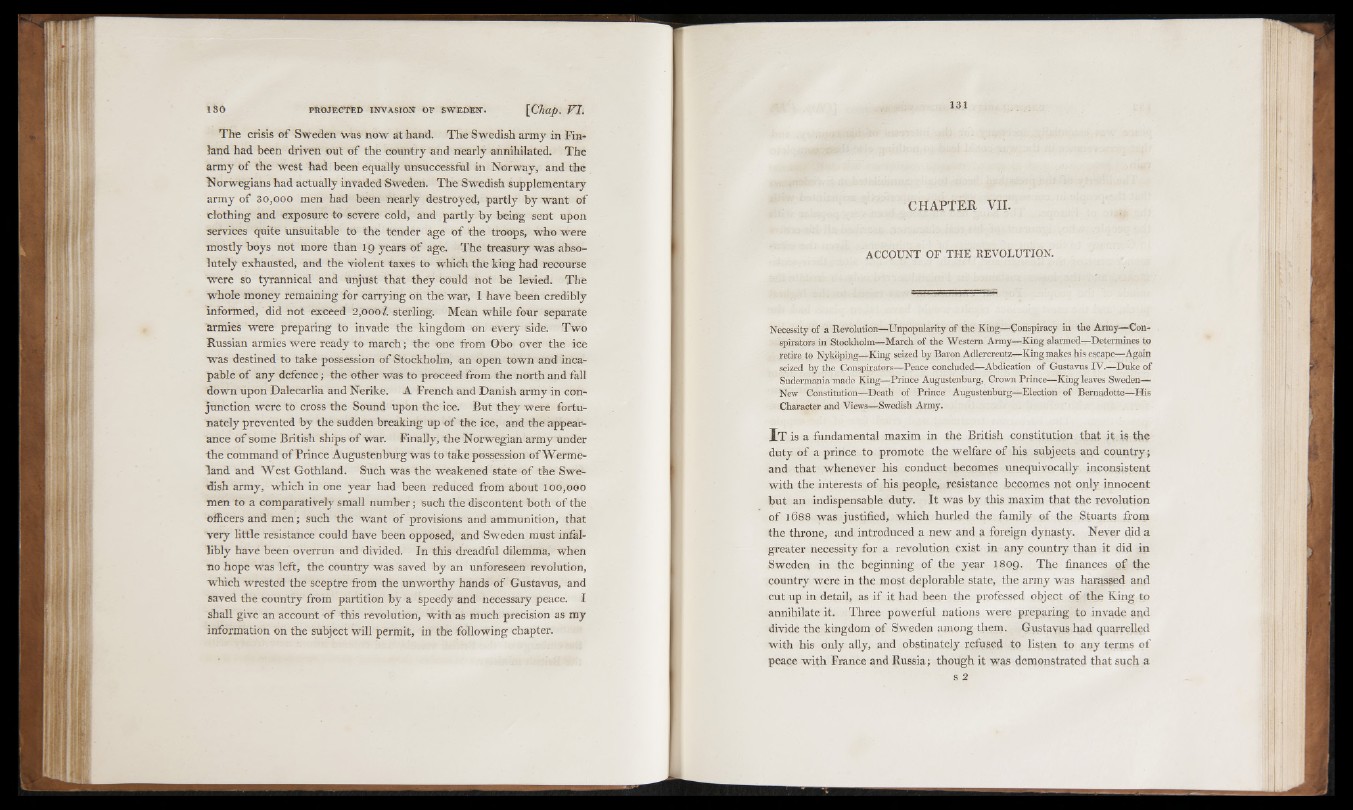
The crisis o f Sweden was now at band. The Swedish army in Finland
had been driven out o f the country and nearly annihilated. The
army o f the west had been equally unsuceesS&l in Norway, and the
Norwegians had actually invaded Sweden. The Swedish supplementary
army o f 30,000 men had been nearly destroyed, partly by want of
clothing and exposure to severe cold, and partly fey being sent upon
services quite unsuitable to the tender age o f the troops, who were
mostly boys not more than IQ years o f age. The treasury was absolutely
exhausted, and the violent taxes to which the king had recourse
were so tyrannical and unjust that they could not be levied. The
whole money remaining for carrying on the war, I have been credibly
informed, did not exceed 2,000/. sterling. Mean while four separate
armies were preparing to invade the kingdom on every side. Two
Russian armies were ready to march; the one from Obo over the ice
was destined to take possession of Stockholm, an open town and incapable
o f any defence; the other was to proceed from the north and fall
down upon Dalecarlia and Nerike. A French and Danish army in conjunction
were to cross the Sound upon the ioe. But they were fortunately
prevented by the sudden breaking up o f the ice, and the appearance
o f some British ships o f war. Finally, the Norwegian aTm y under
the command o f Prince Augustenburg was to take possession o f Werme-
land and West Gothland. Such was the weakened state of the Swedish
army, which in one year had been reduced from about 100,000
men to a comparatively small number; such the discontent both o f the
officers and men; such the want of provisions and ammunition, that
very little resistance could have been opposed, and Sweden must infallibly
have been overrun and divided. In this dreadful dilemma, when
no hope was left, the country was saved by an unforeseen revolution,
which wrested the sceptre from the unworthy hands of Gustavus, and
saved the country from partition by a speedy and necessary peace. I
shall give an account o f this revolution, with as much precision as my
information on the subject will permit, in the following chapter.
CH A P T E R VII.
ACCOUNT OF THE REVOLUTION.
Necessity of a Revolution—Unpopularity of the King—Conspiracy in the Army—Conspirators
in Stockholm—March of the Western Army—King alarmed—Determines to
retire to Nykoping—King seized by Baron Adlercreutz—King makes his escape—Again
seized hy the Conspirators—Peace concluded—Abdication of Gustavus IV.—Duke of
Snderinania made King—Prince Augustenburg, Crown Prince—King leaves Sweden—
New Constitution—Death of Prince Augustenburg—Election of Bemadotte—His
Character and Views—Swedish Army.
I t is a fundamental maxim in the British constitution that it is the
duty of a prince to promote the welfare o f his subjects and country;
and that whenever his conduct becomes unequivocally inconsistent
with the interests of his people, resistance becomes not only innocent
but an indispensable duty. It was by this maxim that the revolution
of 1688 was justified, which hurled the family of the Stuarts from
the throne, and introduced a new and a foreign dynasty. Never did a
greater necessity for a revolution exist in any country than it did in
Sweden in the beginning o f the year 1809. The finances o f the
country were in the most deplorable state, the army was harassed and
cut up in detail, as i f it had been the professed object o f the King to
annihilate it. Three powerful nations were preparing to invade and
divide the kingdom of Sweden among them. Gustavus had quarrelled
with his only ally, and obstinately refused to listen to any terms of
peace with France and Russia; though it was demonstrated that such a
s 2